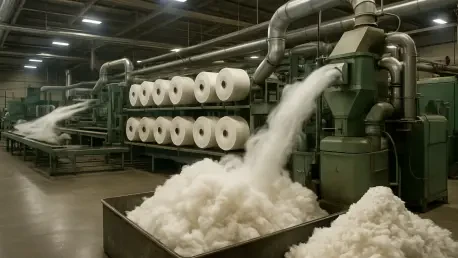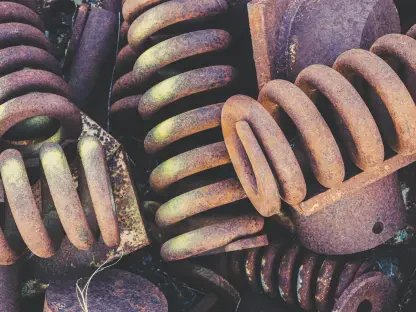In an era where sustainability is no longer just a buzzword but a critical imperative for industries worldwide, a groundbreaking development in polyester production has emerged to address both environmental and operational challenges. Clariant, a global leader in specialty chemicals, has introduced an innovative titanium-based catalyst solution under its AddWorks™ brand, poised to revolutionize the polyester manufacturing landscape. This cutting-edge technology promises to reduce environmental impact by eliminating heavy metals like antimony from the process while enhancing product quality and production efficiency. Set for a commercial launch in 2026, this advancement comes at a pivotal moment as the industry grapples with supply chain disruptions and increasing regulatory pressures. By offering a safer, more sustainable alternative, this solution not only caters to the demands of eco-conscious consumers but also supports manufacturers in achieving their long-term sustainability goals.
1. Addressing Supply Chain and Environmental Concerns
The polyester industry has been facing significant hurdles due to recent restrictions on antimony, a critical component in traditional catalysts, stemming from export controls implemented by China since last year. As a major global supplier of this material, China’s policies have created uncertainty for manufacturers, prompting an urgent need for alternative solutions. Clariant’s titanium-based catalyst technology steps in as a timely answer, completely removing reliance on antimony and mitigating supply chain risks. This innovation ensures that polyester producers can maintain consistent output without being vulnerable to geopolitical or market fluctuations. Beyond addressing availability issues, the technology offers superior color performance in end products, which is essential for applications in packaging and textiles where visual appeal is paramount. This shift not only secures production stability but also aligns with the growing demand for sustainable practices across the supply chain.
Equally important is the environmental edge provided by this new catalyst solution. Unlike antimony-based alternatives, titanium-based catalysts exhibit lower environmental mobility and toxicity, reducing the risk of bioaccumulation in ecosystems. This makes them a safer choice for both people and the planet, addressing long-standing concerns about the ecological footprint of polyester production. Additionally, the technology simplifies the recycling process for polyethylene terephthalate (PET), supporting circularity in the industry. By enabling the production of heavy metal-free polyester, Clariant helps manufacturers meet stringent regulatory requirements and consumer expectations for greener products. This development is particularly significant for PET, given its dominant share in the global market, though the catalyst is versatile enough to be applied across various polyester types, ensuring broad applicability and impact.
2. Enhancing Performance and Efficiency in Production
A standout feature of Clariant’s titanium-based catalyst is its ability to optimize the polyester polymerization process through a kinetic boosting effect. This results in lower processing temperatures and reduced energy consumption, which are critical factors in cutting operational costs and minimizing environmental impact. Manufacturers adopting this technology can expect improved production efficiency, as the catalyst ensures consistent activity without the risk of deactivation or unwanted by-products. The outcome is reliable polymer quality, higher productivity, and reduced downtime during production runs. These benefits are vital for industries like textiles and packaging, where maintaining high standards while scaling output is a constant challenge. The innovation thus offers a dual advantage of sustainability and enhanced operational performance, setting a new benchmark for polyester manufacturing.
Beyond immediate operational gains, the economic benefits of this technology are substantial. Polyester producers stand to achieve potential savings in both capital expenditure (CAPEX) and operational expenditure (OPEX) through increased production capacity and lower wastewater treatment costs. The water-stable formulation of the catalyst further contributes to smoother production processes, minimizing disruptions and ensuring long-term cost efficiency. This aligns with broader industry trends toward more cost-effective and environmentally responsible manufacturing practices. For resin manufacturers, fiber producers, and PET recyclers, this solution provides a competitive edge in a market increasingly driven by sustainability credentials. By integrating this technology, companies can not only improve their bottom line but also position themselves as leaders in responsible production, appealing to both regulators and environmentally conscious consumers.
3. Future-Proofing the Polyester Industry
Looking ahead, Clariant’s titanium-based catalyst technology is designed to meet the evolving needs of the polyester sector, offering a future-proof solution for a range of stakeholders. From technology licensors to brand owners, the ability to produce high-quality, heavy metal-free polyester addresses mounting pressures from both regulatory bodies and end consumers. The solution’s versatility across the polyester family, including emerging materials like PEF, ensures that it remains relevant as material innovations continue to unfold. This adaptability is crucial in an industry where staying ahead of trends and regulations can determine market success. As sustainability becomes a core driver of purchasing decisions, this technology empowers companies to differentiate their offerings and build trust with eco-aware audiences.
Reflecting on the strides made, the introduction of this catalyst marks a significant milestone in redefining polyester production. It tackles pressing supply chain vulnerabilities while delivering tangible environmental and economic benefits. Moving forward, stakeholders are encouraged to explore how such innovations can be integrated into their operations to drive efficiency and sustainability. Consideration of partnerships with solution providers like Clariant could accelerate the transition to greener practices. As the commercial rollout approaches in 2026, the industry stands at the cusp of transformation, with an opportunity to redefine standards and prioritize long-term ecological responsibility. Embracing these advancements promises not only to address current challenges but also to pave the way for a more resilient and sustainable future in polyester manufacturing.









